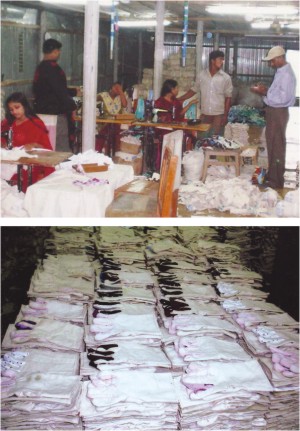| Journey through Bangladesh
From Comilla
The Glovemakers of Etobarpur
Zakir Azad
 THE Etobarpur village is located about 4-kilometers south-west of Chandina upazila, Comilla. The people of this village are quite self-conscious. They don't want to start begging. Most people here are poor and illiterate. However, these people are hardworking and they have changed their economic condition. They've done this by making gloves. By making and selling gloves, each one of them is now self-dependent. THE Etobarpur village is located about 4-kilometers south-west of Chandina upazila, Comilla. The people of this village are quite self-conscious. They don't want to start begging. Most people here are poor and illiterate. However, these people are hardworking and they have changed their economic condition. They've done this by making gloves. By making and selling gloves, each one of them is now self-dependent.
The glove making enterprise started in Etobarpur in 2000. Abu Taher of the village first learnt this craft in Chittagong. He imported this skill to his own village. When he first started doing this, his nephew Mustafa gained the know-how from him and set up his own workshop. Some young people then learnt this skill from him and set up their own workshops. This is how, slowly and steadily, the glove industry grew in Etobarpur.
These glove-making entrepreneurs started buying tent material for 10 taka a piece and old, unusable t-shirts for 30 taka per kg. Later all this cloth is heaped and glued together with premium glue, dried in the sun. The cloth is then 'reversed' using a pipe machine and this becomes a glove.
Orders are taken from large steels mills in Dhaka and Chittagong. After the gloves are made, they are dropped off at the mills. Payment from the mills is collected monthly.
Some workers at the glove-making workshops, like Sheila Akhtar, Akhi Akhtar, Akhtar Mainuddin, Zakir, Amir Hossain said that they work everyday from seven to five and get only one little break. They get paid about taka 1600-1800.
The owner of the biggest workshop Zakir Hossain said that he delivers gloves to Al-Noor Steel Mills, Apollo Steel Mills and Chittagong's Abul Khayer Steel Mills, PHP Steel Mills and S. Alam Steel Mills twice a week. He has not encountered any major problems yet. He can never produce quite as much as the quantity demanded though. He says the local and international demand for gloves is high. However, manufacturing costs have gone up but the glove prices have remained the same. This is lowering the profits. Currently, the cost of producing one pair of gloves is taka 4.50, while the price it fetches is taka 6. Everyday about 2000 gloves are made in 13 workshops in this village. Etobarpur is another shining example in how a whole village can change its fate.
Copyright
(R) thedailystar.net 2008 |

